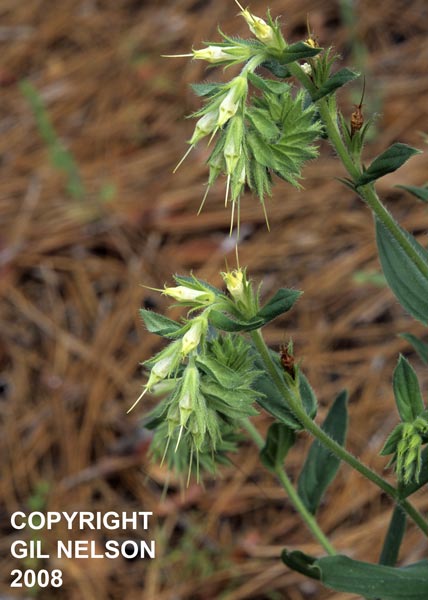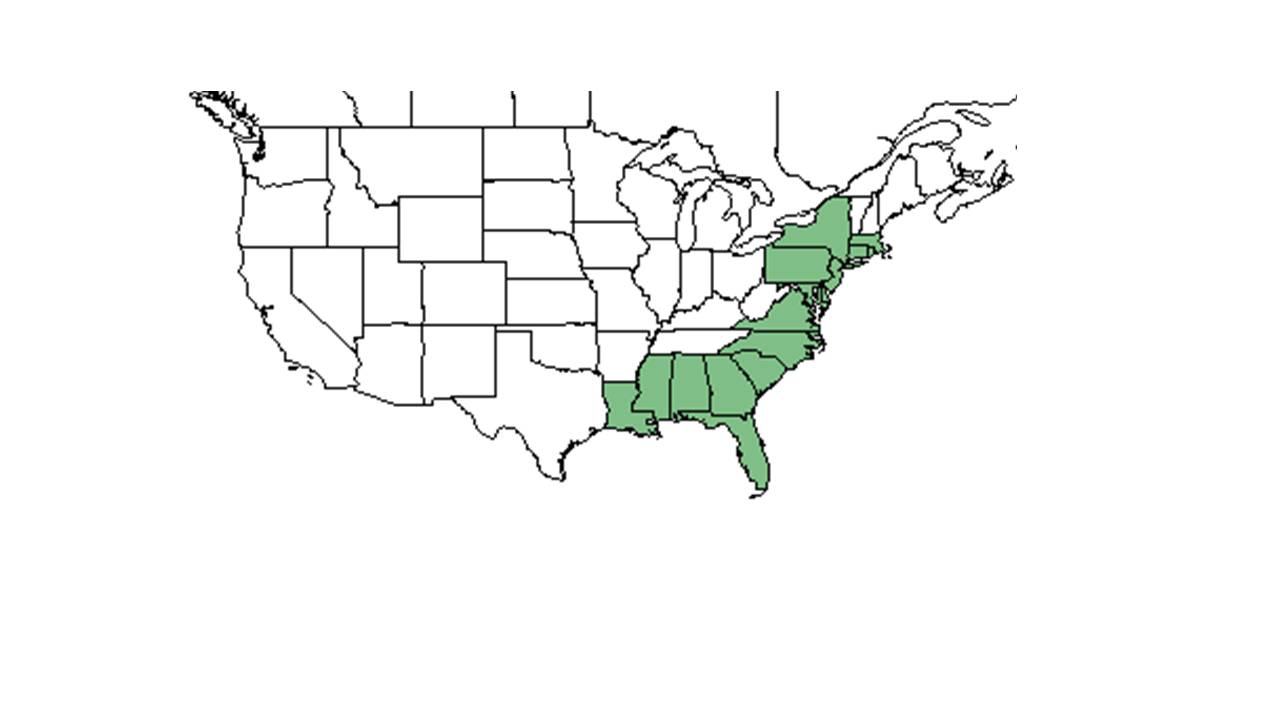Difference between revisions of "Lithospermum virginianum"
KatieMccoy (talk | contribs) (Created page with "{{italic title}} <!-- Get the taxonomy information from the NRCS Plants database --> {{taxobox | name = Lithospermum virginianum | image = Onosmodium virginianum_Gil.jpg | ima...") |
|||
| (20 intermediate revisions by 9 users not shown) | |||
| Line 17: | Line 17: | ||
| range_map_caption = Natural range of ''Lithospermum virginianum'' from USDA NRCS [http://www.plants.usda.gov Plants Database]. | | range_map_caption = Natural range of ''Lithospermum virginianum'' from USDA NRCS [http://www.plants.usda.gov Plants Database]. | ||
}} | }} | ||
| + | Common names: wild Job's tears, Virginia marbleseed<ref name=weakley>Weakley, A.S. 2020. Flora of the Southeastern United States. Edition of 20 October 2020. University of North Carolina at Chapel Hill, Chapel Hill, North Carolina.</ref> | ||
| + | ==Taxonomic notes== | ||
| + | Synonyms: ''Onosmodium virginianum'' (Linnaeus) A.L.P.P. de Candolle<ref name=weakley/> | ||
| + | |||
| + | Varieties: none<ref name=weakley/> | ||
| − | |||
| − | |||
==Description== | ==Description== | ||
<!-- Basic life history facts such as annual/perrenial, monoecious/dioecious, root morphology, seed type, etc. --> | <!-- Basic life history facts such as annual/perrenial, monoecious/dioecious, root morphology, seed type, etc. --> | ||
| − | '' | + | ''Lithospermum virginianum'' is a perennial herbaceous species. |
==Distribution== | ==Distribution== | ||
| + | ''L. virginianum'' ranges from Louisianna to Florida, and north along the Coastal Plain to New York and Massachusetts. Though it is rare, the species is found in North Carolina.<ref name=weakley/> | ||
| + | |||
==Ecology== | ==Ecology== | ||
===Habitat=== <!--Natural communities, human disturbed habitats, topography, hydrology, soils, light, fire regime requirements for removal of competition, etc.--> | ===Habitat=== <!--Natural communities, human disturbed habitats, topography, hydrology, soils, light, fire regime requirements for removal of competition, etc.--> | ||
| − | '' | + | ''L. virginianum'' grows in dry loamy sand, like that which occurs in sandhill and longleaf pine-scrub oak sand ridge communities, as well as disturbed habitat, including roadsides and power line corridors.<ref name="FSU Herbarium">Florida State University Robert K. Godfrey Herbarium database. URL: [http://herbarium.bio.fsu.edu http://herbarium.bio.fsu.edu]. Last accessed: June 2014. Collectors: M. Davis, Robert K. Godfrey, R. Komarek, Rodie White, R. A. Norris, and Loran C. Anderson. States and Counties: Florida: Jackson, Leon, and Wakulla. Georgia: Grady and Thomas.</ref> Weakley (2015) reports that in the Southern and mid-Atlantic states, it is restricted to highly acidic sands in fall-line sandhills and circumneutral soils derived from mafic rocks (Piedmont), calcareous rocks (Mountains), or calcareous shell (Coastal Plain).<ref name=weakley/> |
===Phenology=== <!--Timing off flowering, fruiting, seed dispersal, and environmental triggers. Cite PanFlora website if appropriate: http://www.gilnelson.com/PanFlora/ --> | ===Phenology=== <!--Timing off flowering, fruiting, seed dispersal, and environmental triggers. Cite PanFlora website if appropriate: http://www.gilnelson.com/PanFlora/ --> | ||
| − | + | This species flowers from April through September and May through October.<ref name=weakley/> | |
| + | <!--===Seed dispersal===--> | ||
| + | <!--===Seed bank and germination===--> | ||
| − | |||
| − | |||
===Fire ecology=== <!--Fire tolerance, fire dependence, adaptive fire responses--> | ===Fire ecology=== <!--Fire tolerance, fire dependence, adaptive fire responses--> | ||
| − | This species has been found in habitat that is maintained by frequent fires | + | This species has been found in habitat that is maintained by frequent fires<ref name="FSU Herbarium"/> as evidenced by populations of ''Lithospermum virginianum'' that have been known to persist through repeated annual burns.<ref>Robertson, K.M. Unpublished data collected from Pebble Hill Fire Plots, Pebble Hill Plantation, Thomasville, Georgia.</ref> |
| + | <!--===Pollination===--> | ||
| + | <!--===Herbivory and toxicology===--> | ||
| + | <!--===Diseases and parasites===--> | ||
| − | == | + | ==Conservation, cultivation, and restoration== |
| − | + | ||
| − | + | ==Cultural use== | |
| − | |||
| − | == | ||
==Photo Gallery== | ==Photo Gallery== | ||
| + | <gallery widths=180px> | ||
| + | </gallery> | ||
| + | |||
==References and notes== | ==References and notes== | ||
| − | |||
Latest revision as of 12:16, 16 June 2023
| Lithospermum virginianum | |
|---|---|

| |
| Photo taken by Gil Nelson | |
| Scientific classification | |
| Kingdom: | Plantae |
| Division: | Magnoliophyta - Flowering plants |
| Class: | Magnoliopsida – Dicotyledons |
| Order: | Lamiales |
| Family: | Boraginaceae |
| Genus: | Lithospermum |
| Species: | L. virginianum |
| Binomial name | |
| Lithospermum virginianum (L.) A. DC. | |

| |
| Natural range of Lithospermum virginianum from USDA NRCS Plants Database. | |
Common names: wild Job's tears, Virginia marbleseed[1]
Contents
Taxonomic notes
Synonyms: Onosmodium virginianum (Linnaeus) A.L.P.P. de Candolle[1]
Varieties: none[1]
Description
Lithospermum virginianum is a perennial herbaceous species.
Distribution
L. virginianum ranges from Louisianna to Florida, and north along the Coastal Plain to New York and Massachusetts. Though it is rare, the species is found in North Carolina.[1]
Ecology
Habitat
L. virginianum grows in dry loamy sand, like that which occurs in sandhill and longleaf pine-scrub oak sand ridge communities, as well as disturbed habitat, including roadsides and power line corridors.[2] Weakley (2015) reports that in the Southern and mid-Atlantic states, it is restricted to highly acidic sands in fall-line sandhills and circumneutral soils derived from mafic rocks (Piedmont), calcareous rocks (Mountains), or calcareous shell (Coastal Plain).[1]
Phenology
This species flowers from April through September and May through October.[1]
Fire ecology
This species has been found in habitat that is maintained by frequent fires[2] as evidenced by populations of Lithospermum virginianum that have been known to persist through repeated annual burns.[3]
Conservation, cultivation, and restoration
Cultural use
Photo Gallery
References and notes
- ↑ 1.0 1.1 1.2 1.3 1.4 1.5 Weakley, A.S. 2020. Flora of the Southeastern United States. Edition of 20 October 2020. University of North Carolina at Chapel Hill, Chapel Hill, North Carolina.
- ↑ 2.0 2.1 Florida State University Robert K. Godfrey Herbarium database. URL: http://herbarium.bio.fsu.edu. Last accessed: June 2014. Collectors: M. Davis, Robert K. Godfrey, R. Komarek, Rodie White, R. A. Norris, and Loran C. Anderson. States and Counties: Florida: Jackson, Leon, and Wakulla. Georgia: Grady and Thomas.
- ↑ Robertson, K.M. Unpublished data collected from Pebble Hill Fire Plots, Pebble Hill Plantation, Thomasville, Georgia.